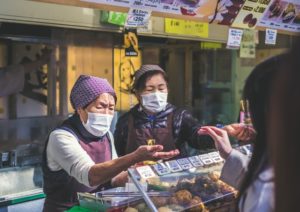The Role of Women During COVID-19
 Amidst the COVID-19 pandemic, women have assumed positions of leadership in several fields to fight the virus. Women work hard at home to take care of their families, while also constituting a majority of those on the front lines in the global healthcare industry. They are discovering innovative new ways to generate income through agriculture, and are even manufacturing masks in refugee camps. Here are a few of the many heroic responsibilities undertaken by women during COVID-19.
Amidst the COVID-19 pandemic, women have assumed positions of leadership in several fields to fight the virus. Women work hard at home to take care of their families, while also constituting a majority of those on the front lines in the global healthcare industry. They are discovering innovative new ways to generate income through agriculture, and are even manufacturing masks in refugee camps. Here are a few of the many heroic responsibilities undertaken by women during COVID-19.
Women at Home
Worldwide, almost 22% of women care for their families through unpaid labor, while only about 2% of men provide this kind of care. As caregivers at home, women play a crucial role in maintaining the safety of their families and communities. This task goes well beyond managing others’ physical health; women cook, clean, supervise children and elders and gather resources like water and wood. In addition, with lockdown measures, kids and other family members are home more often, increasing demands on these women.
Women in Healthcare
During the COVID-19 pandemic, women have taken the lead in providing medical care for patients. Because women make up 70% of the global healthcare and social services industries, many women have now become essential workers and hold the huge task of caring for patients, often at the expense of their own safety.
Healthcare workers like Dr. Entela Kolovani of Albania have been treating patients day and night since the pandemic hit in March. Women in healthcare are juggling several roles as they take care of those who are sick while trying to avoid endangering their families. Women are working longer hours and facing new challenges every day. In describing her nurses, Dr. Kolovani said, “Their work never ends, from making up the beds of patients, to performing therapies, taking tests and filling in documents. I am so deeply grateful to them.”
Women in Agriculture
The role of women during COVID-19 is not just limited to the healthcare field. Globally, nearly one out of every three women are employed in the agricultural industry; women in rural settings have inspired their communities to take safety precautions and earn income through farming. For example, in northwestern China, women in rural villages are ensuring compliance with social distancing practices are met and learning the trade of pig farming to earn extra income for their families. One such woman, Yan Shenglian, is training other women in this trade and teaching them the importance of women in the agricultural sector during COVID-19.
In addition, women in Cote d’Ivoire worked with UNICEF and the World Food Programme to spread health and sanitation measures to other women farmers. Along with the work already being done to encourage efficient farming practices, women in these rural villages are prioritizing food security and safety during COVID-19.
Women as Refugees
Of those affected by the pandemic, refugees have been disproportionately impacted. Nearly 80% of refugees are concentrated in low-income countries, where access to proper sanitation and basic resources is limited. As nearly half of all refugees are girls and women, the effect of COVID-19 on women refugees is especially high. However, these individuals have also stepped up to fight the pandemic. In partnership with the U.N., Rohingya women in the world’s largest refugee camp have made more than 50,000 masks for distribution. This initiative involved almost 50 families with female breadwinners, allowing these women to bring additional income to their families and teaching lasting leadership skills.
Looking Forward
Women have stepped up to lead the fight against the pandemic in a plethora of ways. They are keeping communities safe while generating income. These are just a few examples of the many critical roles adopted by women during COVID-19; there is no doubt that their presence will continue to be instrumental throughout the pandemic and beyond.
– Anita Durairaj
Photo: Unsplash
